Secondary Subject Leaders’ Community- Summer Conference (Surinder Panesar)
19th June – here we were; GCSE Maths exams had come and gone; Year 13 students were in their final A Level Maths exam (and no more could be done); summer had finally arrived and we were all looking forward to the 4th Secondary Maths Subject Leaders conference (actually it was our 6th conference but we had to concede two of them to Covid restrictions). Time to be inspired, empowered, challenged and collaborate with other Subject Leaders!
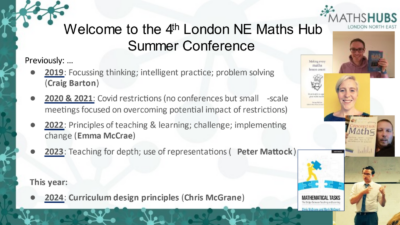
It was a real pleasure to be joined by over secondary 60 maths leads from 26 schools from Community A (Havering, Redbridge and Barking & Dagenham), 9 schools from Community B (Newham, Hackney and Waltham Forest) and 5 new schools looking to join the communities next year. Our keynote speaker later commented about the communities: “a really fantastic set up and I am envious of the Maths Hub approach – I very much wish we had something equivalent in Scotland.”
The conference kicked off in a celebratory mood with the Secondary Assistant Maths Hub lead sharing some excellent statistics of school engagement in our 10th year of being the London NE Maths Hub – currently, 80% of the 108 secondary schools in the hub area have engaged with the PD offered through the London NE Maths Hub. This does not include the 5 new schools that have expressed an interest by attending this summer conference.
Our keynote speaker, Chris McGrane focussed his three sessions on curriculum design, which has featured strongly in the latest Ofsted maths report: Coordinating mathematical success. Chris is a current practitioner and is the Principal Teacher of Maths (HoD) in a school in Scotland; he has also led countless PD sessions nationally and is the joint author (with Mark McCourt) of the ‘Mathematical Tasks – bridge from teaching to learning’ book. His current website https://startingpointsmaths.com/ has a plethora of great materials based around task design and the maths curriculum. The outstanding thinking shared in this summer conference made reference to some key curriculum booklets that support teachers to plan a coherent sequence of learning episodes that promotes connections in and understanding of mathematics.
The first session focused on ‘what is a curriculum’? The initial discussion moved thinking on rapidly until a colleague shared “Curriculum should include ‘How the students learn it’ and ‘How they connect it’!” This together with Michael Fullan’s comment on focussing on the fundamentals in his research article in 1997 formed the basis of the key take away from the first session:
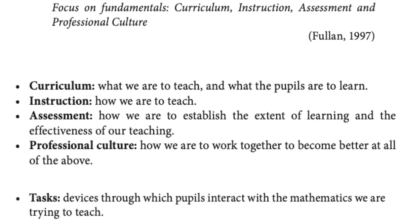
Opportunities were created for us as learners to work on ‘connectionists tasks’, like those based on Pointon & Sangwin’s taxonomy:
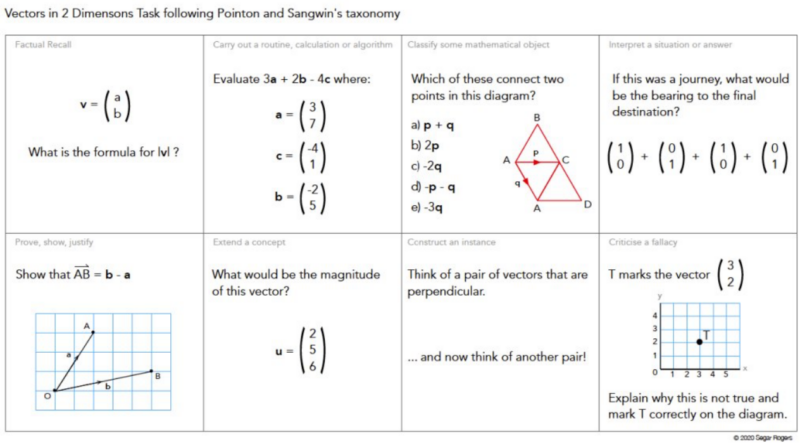
The second session on curriculum design: didactics began on ‘put flesh on the bones’ as Subject Leaders were exposed to the high-quality set of carefully sequenced tasks in a curriculum booklet supported teachers to plan good learning experiences for students. The stand out learning point for many Subject Leaders was the development of the learning through the use of double-sided counters (in a unit on directed number) led to students beginning to generalise. There was almost an ‘audible’ wow-moment when the generalising task (see below) was trialled by the participants:
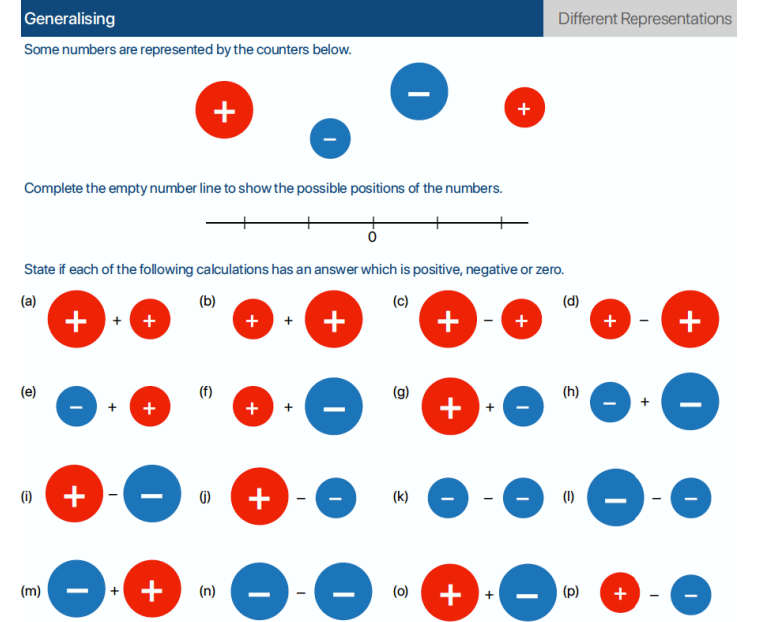
There was a realisation that the key to supporting students to consistently and accurately generalise, was to consider (from the outset) that subtraction is the additive inverse, e.g. (-1) – (-2) “negative one subtract negative 2” is the same as (-1) +(+ 2) “negative one add positive two”.
The final session, was a Chris’ own case study of the tension between theory and practice and how it developed at his school. A key point was having a clear understanding of the similarities and differences of the spiral curriculum and the strand curriculum.
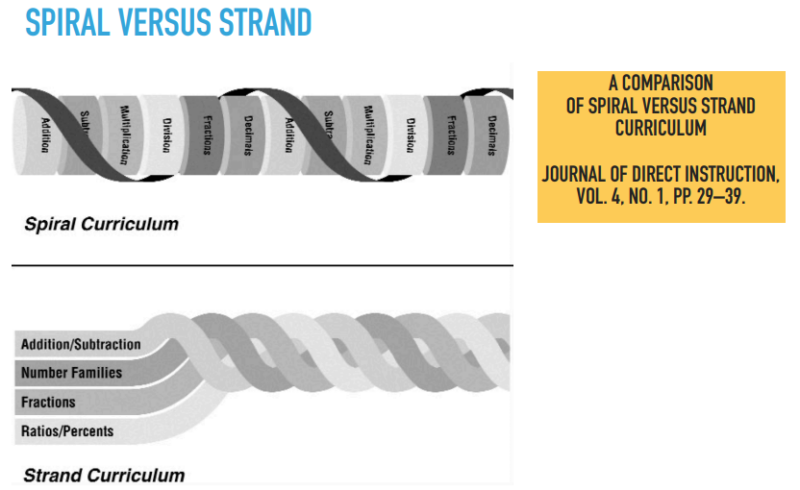
One subject leader said “I was not sure how the strand curriculum was going to work (nice idea), but it came to life when Chris showed the spaced learning implemented in his A Level scheme”. The session ended with some very helpful suggestions about creating flexibility in the curriculum depending on the group of students in front of you – not just a rigid curriculum that gets delivered to all students year after year.
The final session of the summer conference supported Subject Leaders to reflect on the content of the day and the next steps. Additional reflections focused on celebrating how the collective input over this academic year had supported their departments to move forward and to consider what still needs further work. A new Subject Leader said “My understanding of what good leadership looks like and how to use research-based evidence to improve the learning of maths. Working alongside other subject leaders has also helped to think about what a good leader looks like. I have realised I need an action plan and need to focus on a small change.”
Personally, I have thoroughly valued the opportunity to work with my colleagues at the London NE Maths Hub to provide teachers and Subject Leaders and opportunity for free professional development that allows them to network and collaborate as a community. I now will focus on planning the next sequence of community workshops for Subject Leaders in 2024-25. If you would like to join either of the Subject Leader Communities, then please use this link and visit our secondary PD page on the London NE Maths Hub website: https://lneastmathshub.org.uk/get-involved/secondary/
Surinder Panesar
Assistant Maths Hub Lead (Secondary)
London NE Maths Hub.
